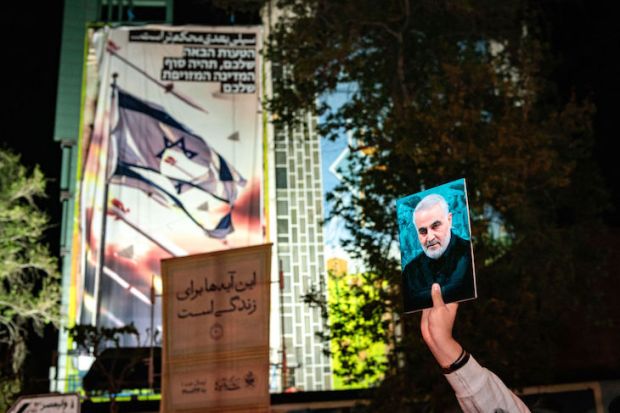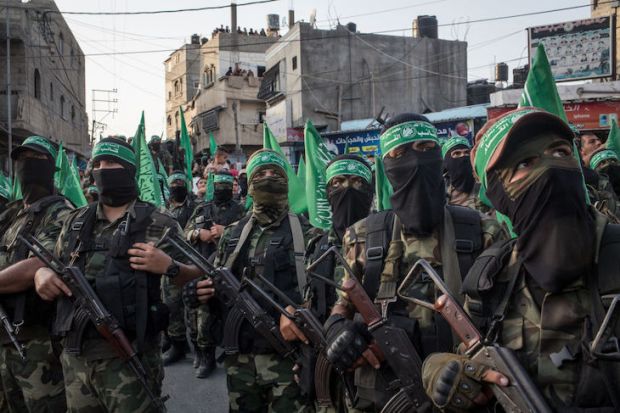Since the start of the war, many comparisons have been drawn between Israel and Ukraine, not least by President Zelensky. Last week, he said he wanted his country to become a ‘big Israel’ in terms of its focus on security in the years to come. And, of course, in terms of a plucky, advanced democracy thriving in the midst of a sea of hostility.
Ukraine’s population is four times bigger than that of Israel. Its territory is more than 13 times the size. The threats it faces are not asymmetrical but those of an old-fashioned hostile state, with tanks and heavy artillery. Israel’s totemic defence systems, such as the Iron Dome missile umbrella, were not designed for such an environment.
Yet the inspiration seems to have a common root. Golda Meir, Israel’s first female prime minister, was born in Ukraine and has become a symbol of devotion in the war-torn country.
Last month, a video went viral featuring a Ukrainian frontline soldier with the nom de guerre of ‘Zion’, who carried a biography of the Israeli leader into battle alongside his night vision sight and assault rifle. ‘I’m a Zionist,’ he declared, proudly.
The spirit is the same. And given the recent atrocities in Bucha, one wonders if an Israeli-style response wouldn’t be in order.
The former BBC journalist John Sweeney, who has been reporting from Ukraine for the Jewish Chronicle these past few weeks, visited the scene of the apparent civilian executions this week.
‘”Never again” feels a bitter, dark joke when you look at what lies in the death pit opposite the main Orthodox Church,’ he wrote. ‘There’s a hand with flesh on it but the flesh has gone greeny-blue, pointing upwards.’
When I read these words, it sent me on a spiral of thoughts and memories that landed me in Buenos Aires in 2018.
I had been sent there by the Mail to establish the fates of the progeny of Adolf Eichmann, the architect of the Nazi Holocaust. After a week of hard reporting, I managed to uncover the stories of all four of Eichmann’s sons, some of whom were card-carrying neo-Nazis. One of them, Dieter Eichmann – said to be the custodian of his notorious father’s papers – still lived in Buenos Aires.
His apartment was just a few miles from the spot where his father was abducted in 1960 by Mossad, to face trial in Jerusalem. I buzzed on the bell. He refused to let me in, but my brilliant photographer, Nick Edwards, snapped him as he and his wife came to the window to check I’d gone. Dieter Eichmann’s fate had been unknown for almost 70 years.
There can be no comparison, of course, between the Holocaust and the ghastly events in Ukraine. But over the past week, there have been many evocations of the Nuremberg trials when discussing the fate of those who perpetrated the massacre in Bucha.
It made me think of Eichmann, who was tracked and kidnapped by Mossad spies before being spirited out the country to face justice in Israel. On the same reporting trip as the one in which I’d tracked down his sons, I had spent an afternoon with his daughter-in-law, who had proudly shown me a cabinet that used to belong to ‘Grandpa Eichmann’.
The man felt just a breath away. Yet through the audacity of Mossad, he had faced a jury and the hangman’s noose.
Fast forward to 1972, when 11 members of the Israeli Olympic team were murdered by the Palestinian terror group Black September. In the years that followed, Israeli intelligence tracked down and assassinated the perpetrators, one by one, all over the world. It was not quite the same as bringing them to trial in Jerusalem, but provided a certain sense of resolution nonetheless.
Ukraine’s secret service, the SBU, is the successor to the Ukrainian branch of the KGB, that was created after independence in 1991. In order to bring justice, Israeli-style, to the perpetrators of the atrocities at Bucha, its members would need to infiltrate Russia or its proxies, and carry out complex kidnap or assassination operations. These missions may be beyond its capabilities. But if I was in a position to help, I would certainly do so. Wouldn’t you?
The Bucha killings have made the world realise that the butchery and brutality of the past still thrive today. And where there are atrocities of this sort, there must be justice, however it is meted out. As horrid as it is to contemplate, the time will soon come for a reckoning. As Golda Meir herself said: ‘We don’t thrive on military acts. We do the because we have to, and thank God we are efficient.’
Got something to add? Join the discussion and comment below.
Get 10 issues for just $10
Subscribe to The Spectator Australia today for the next 10 magazine issues, plus full online access, for just $10.



















Comments
Don't miss out
Join the conversation with other Spectator Australia readers. Subscribe to leave a comment.
SUBSCRIBEAlready a subscriber? Log in